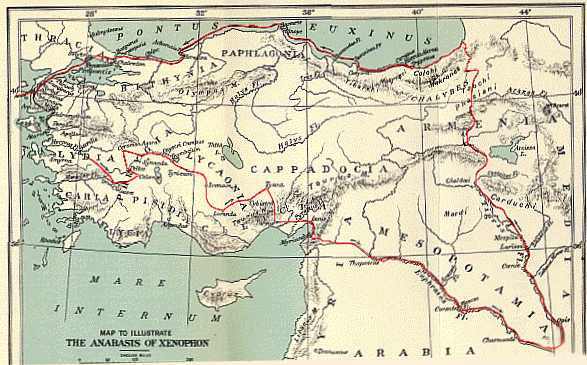I read part of this work in High School over twenty years ago and decided a few weeks ago to finish reading it. Now that I am done, I wonder why I waited so long. The book was written by Xenophon, and ancient Greek soldier and general, in the late 4th Century BC.
Xenophon’s account in The Anabasis is one of the first true (in several senses of the word) adventure stories to be transmitted from antiquity. There is as much adventure here as will be found in any modern day work of fiction. One of the things that makes this book so great is that as I was reading the book it was constantly in the back of my mind that these events really happened. The book is part adventure and part autobiography told from the 3rd person.
The background is that in 402 B.C. Cyrus the Younger of Persia hired an army of Greek mercenaries to help him overthrow his brother Artaxerxes II, the legitimate ruler of the Persian Empire. Everything went swimmingly until Cyrus was killed in battle. The Greek army hired by Cyrus was in a tight position, Artaxerxes did not have the force to crush without taking unacceptable casualties but he equally did not want them to escape. The Persian answer was to feign letting the Greeks start on their way home providing them provisions, guides, and quarters along the way. The the Persians tricked the Greek generals into attending a dinner under flag of truce and had all the Greek generals executed.
It is at this point that Xenophon steps forward and is elected general and co-leader of the remaining Greeks. The rest of the story is a recounting of the many trials and tribulations the Greek army of Ten Thousand makes its way home fighting numerous battles, encountering hostile people, terrain, and weather.
- The Route of Xenophons March Up Country
The only complaint, if complaint it can be called, is that the speeches ascribed to various characters are not 100% accurate. This is true of many ancient Greek and Roman writers. What they did was to invent a speech that in its essentials expressed the same message as the actual speech did, perhaps they dressed it up a little. The ancient historians did not have a problem with this practice at all and just considered it god history, that is not true of modern historical practice.
In summation, if anyone would like to read the ancients and does not know where to start, The Anabasisis a good place to start. It is a great story and Xenophon’s prose is concise enough to not bore the casual reader.
.

I would say that Thucydides is an exception when it comes to the accuracy of the speeches found in his history of the Peloponnesian War. He is very likely to have heard many of the speeches himself, including Pericles’ Funeral Oration. He also had access to records and eyewitnesses to speeches he did not hear himself, so he could write reasonable reconstructions of what had been said.
I don’t think that the content of the speeches is unreasonable, they are actually probably pretty close to what was actually said or at least capture the essence. However, they are not word for word reproductions of the speeches. My main point is that a modern historian would get laughed out of the Club if he put something similar in a modern historical wok.